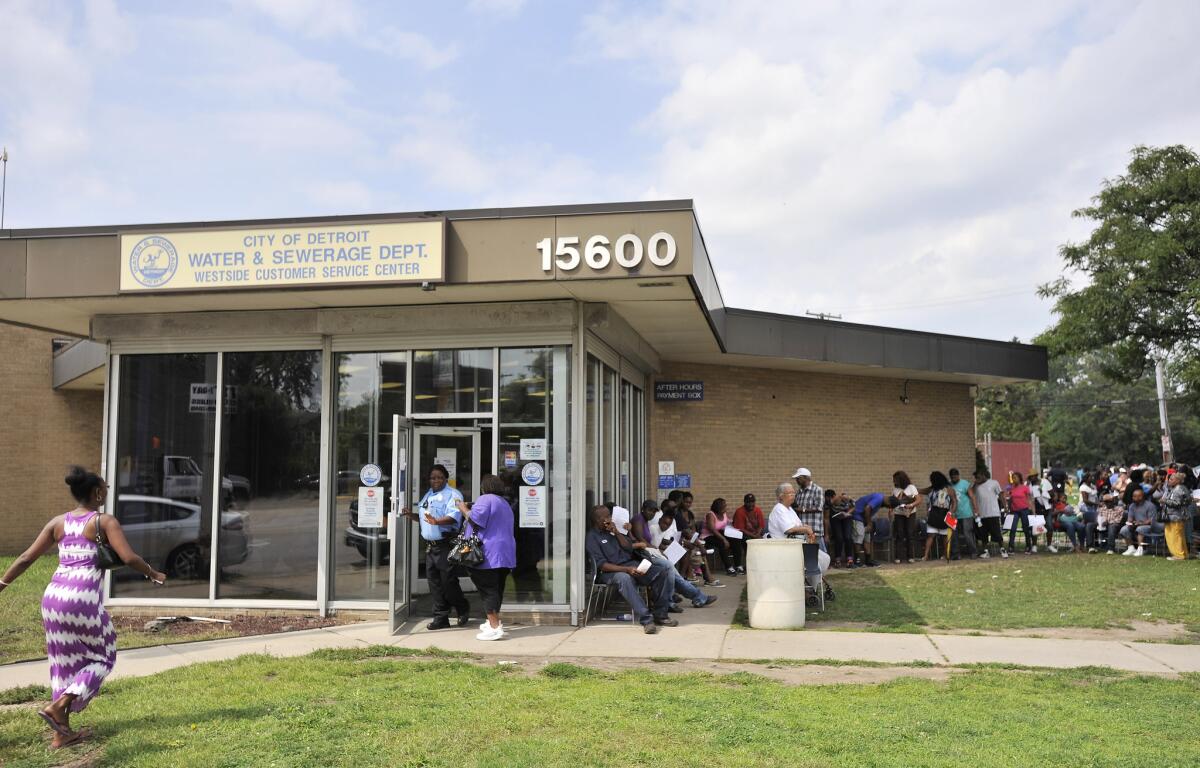Detroit water shut-offs for overdue bills to begin once more

- Share via
More than a month after Detroit was criticized for turning off water to people who had not paid their bills, the water shut-offs are beginning again.
Mayor Mike Duggan had imposed a monthlong moratorium on the shut-offs, which left thousands of people throughout the city without water. But that moratorium extended only until Aug. 25.
The city said the moratorium made it easier for about 150,000 people behind on their bills to catch up on payments. During the moratorium, the city waived turn-on fees for customers whose water had been shut off, extended hours at its customer service centers and announced a number of charitable organizations and individuals who could help residents pay their bills.
It also instituted a plan that allowed residents to pay only 10% of their past due balance, as opposed to the 30% they were expected to pay previously. The plan is not available to those who had been on the plan and missed payments more than twice.
There are 25,000 customers enrolled in a water payment plan, according to the city, and only 17,000 were participating a month ago.
But it seems clear that there are still thousands of people who don’t have the resources to pay their bills, or who are so far behind that they face no alternative but losing access to water.
Nicole Hill, who was featured in a June Los Angeles Times story about the shut-offs, is among those who can’t pay. She spoke to the deputy director of the water department asking why her bill was $6,000 when she had not been living in her apartment very long.
He promised to look into it and investigate whether there were leaks in her area or an erratic meter, she said. Nothing has happened, and although her water was turned back on during the moratorium, she’s already received another shut-off notice.
“They direct me to aid programs, but then they say my bill is over $2,500 so they can’t help me,” Hill said.
Detroit was widely chastised for shutting off water to residents, 38% of whom live below the poverty line. The process of how it went about shutting off service was also widely criticized. When the city ramped up shut-offs in May and June, water department offices were swamped with long lines of people who said they had no idea they were behind on their bills.
It wasn’t until Detroit bankruptcy Judge Steven Rhodes addressed the shut-offs that the city responded to the complaints. During an unrelated hearing in which people objected to the city’s bankruptcy, Rhodes surprised observers by summoning a deputy director of the water department for questioning.
“Your residential shut-off program has caused not only a lot of anger in this city but also a lot of hardship,” he said to Darryl Latimer, the deputy director. “It’s caused a lot of bad publicity for the city it doesn’t need right now.”
Not happy with the city’s response to his questions, Rhodes told the water department representative to come back to his courtroom the following week to report on actions the city would take to try to solve the problem.
“It’s a problem that’s affecting this bankruptcy,” he said at the time.
Hill has gone to the water department three times to try to puzzle through her bill; usually, she’s stood in line for three hours. When she waits on the phone for hours to get through, sometimes the person who answers hangs up without even talking to her. Hill says her water nightmare is the second-worst thing she’s ever had to go through, after surviving a hurricane. She is hoping to leave Detroit.
“If I had the money right now, I would leave Detroit,” she said. “I’m just disenchanted.”
More to Read
Sign up for Essential California
The most important California stories and recommendations in your inbox every morning.
You may occasionally receive promotional content from the Los Angeles Times.











